[Click on BLUE links for further information]
Ever since I was left somewhat alone, without gods, I have been a ferocious believer in the power of small coincidences. That is how chance works, at least for those of us who do not have the certainty of grander schemes. Valeria Luiselli
Brain researchers recently described how “three neurons stretch across both hemispheres of the brain” and “the largest one wraps around the organ’s circumference like a ‘crown of thorns.’” They go on to say “Oddly enough, all three giant neurons happen to emanate from a part of the brain that’s shown intriguing connections to consciousness in the past—the claustrum, a thin sheet of grey matter that could be the most connected structure in the entire brain, based on volume.” It was a mouse’s brain. That would not have stopped Steinbeck who wrote Of Mice and Men from making a strong connection with our own brains.
I’ve often wondered why certain connections pop up seemingly without my conjuring them. Could these neurons and others yet to be discovered explain how this happens? However it works, this post on Richard Henry Dana is about a number of coincidences and connections that recently grasped my attention.

Sea Gull Cellar Bar Napkin Art, Sula artist
America, once the leader of the free world, once a revolutionary force for good, once a font of optimism, the America that I love, that America is becoming insular and small. A friend of mine likes to quote William Butler Yeats: “The best lack all conviction, while the worst are full of passionate intensity.” Today is not unlike times past when the future was cloudy and dark. Impotence predominates when hope is hard to find. We need someone or something to force us to act. It takes an ethical optimist with integrity to pull us through.
Tom Paine, one of my heroes, provided the optimism to rally America to seek the freedom we cherish and love today. Who can forget “These are the times that try men’s souls. The summer soldier and the sunshine patriot will, in this crisis, shrink from the service of their country; but he that stands by it now, deserves the love and thanks of man and woman.”
Unfortunately, those with the greatest integrity often end their lives maligned and forgotten by those most in their debt. “Over a hundred years after Paine’s death, Theodore Roosevelt still referred to him as a ‘filthy little atheist.’” Paine’s bones were lost and remain lost to this day. Though he is not forgotten, he has never received the acclaim he deserves.
Another great patriot, Walt Whitman, wrote his Song of Myself during the dark times leading up to and during the Civil War. His poem, one of the greatest American poems, did not celebrate the inward looking shrinking vision of America that we see today. Whitman, in celebrating himself, celebrated the interconnections between all human beings and all living things. “I celebrate myself, and sing myself, and what I assume you shall assume, for every atom belonging to me as good belongs to you.”
Whitman would not be among those “populists” today who disparage immigrants, legal or illegal. “Not till the sun excludes you, do I exclude you,” he once wrote. He stood up for every man and every woman. Read the touching eulogy of Whitman by the famous orator Robert Ingersoll to get a sense of the man’s humanity and sympathy, a man who “never claimed to be lower or greater than any of the sons of men”.
Richard Henry Dana Jr. was an ethical optimist with integrity like Paine, like Whitman. Like the statesman and the poet, Dana paid a price for holding to his conscience. More of that later, but first let me unravel some of those “small coincidences” that I’ve been thinking about.
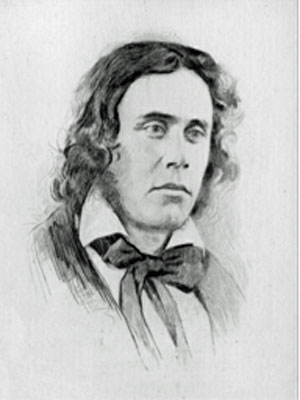
Young Richard Henry Dana Jr. from Slavish Shore by Jeffrey L. Amestoy
I read the book that made Dana famous, Two Years Beyond the Mast, many years ago. A video I viewed recently about a schooner that shipwrecked off the Mendocino coast mentioned Dana and his book and the coincidences began. You can view the video HERE. The 1850 mishap of that schooner, the Frolic, was “the most significant shipwreck on the west coast” according to historians at the San Francisco Maritime Museum. “The significance of the wreck was that the eventual salvage attempt led to the discovery of the redwood forest. The attempt at salvage failed, but the harvesting of the redwoods led to the creation of towns and mills along the Mendocino coast.”
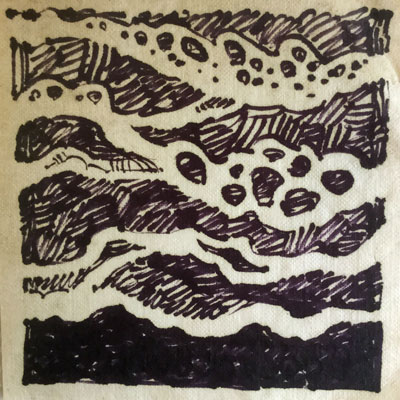
Sea Gull Cellar Bar Napkin Art, artist unknown
The video unravels many of today’s political conundrums. For instance, as early as 1850 San Francisco was a cosmopolitan city with inhabitants from around the world. Mexicans lived there in significant numbers. After all, California was part of Mexico until 1848. San Francisco was home to immigrants from China, Chile, Australia as well as Europeans many of whom had travelled from the Eastern states. It was a city of immigrants as it is today. Another thing I learned was that the United States had a negative balance of trade with China in the first half of the 19th century. Just like today, the trade deficit was a concern. Opium turned the trade balance around. The Frolic was one of several schooners that shipped opium from India to China and returned with silk, tea, and chinaware for the states. The drug trade has not always been from Mexico to the United States. Americans have been active on both the demand and the supply side and we bear our share of responsibility for the pain and suffering drugs impose on all people.
In Two Years Before the Mast, Dana describes his trip from Boston around Cape Horn to California. I wondered if Dana might have known the captain of the ill-fated Frolic, Captain E. H. Faucon, described in the video. Dana’s own book and an excellent new biography of Dana [Slavish Shore: The Odyssey of Richard Henry Dana Jr. by Jeffrey L. Amestoy] show the two did know each other. They met when Dana made his first trip to California on the brig Pilgrim. They met again later when both had returned to Boston.
Dana told the owners of the Frolic that Captain Faucon was “a good seaman … a thing [sailors] are not always ready to say.” This testimony helped Faucon get the job as Captain of the Frolic. Faucon was the polar opposite of the tyrant Captain Thompson who skippered the brig Pilgrim on which Dana sailed around the Cape. One event on that two-year trip changed Dana’s life and fired his innate passion for justice in an unjust world. His biographer [Amestoy] relates the story. I present it here in detail as it is the key to Dana’s admirable life.

Sea Gull Cellar Bar Napkin Art, Mike Evans artist
On a Saturday morning following several days in which “the captain seemed very much out of humor,” Dana stood at the main hatchway awaiting Thompson, who was below deck. Suddenly the master’s voice was raised in violent dispute, followed by sounds of a fight. Dana ran for “John the Swede” and the two men peered down the hatchway where the captain’s voice arose “loud and clear.” “You see your condition! You see your condition! Will you ever give me any more of your jaw!” “I never gave you any, sir.”
It was Sam, his voice “low and half choked.” “That’s not what I ask you. Will you ever be impudent to me again?” “I never have been sir,” said Sam. “Answer my question or I’ll make a spread eagle of you! I’ll flog you, by God.” “I’m no negro slave,” said Sam. “Then I’ll make you one,” said the captain. Thompson ordered the first mate to seize the hapless sailor: “Make a spread eagle of him! I’ll teach you all who is master aboard!” Sam did not resist and was carried to the gangway, the crew following.
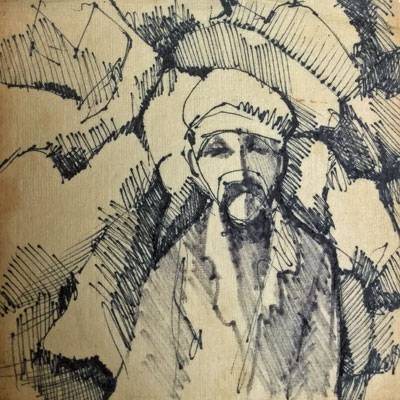
Sea Gull Cellar Bar Napkin Art, artist unknown
“What are you going to flog that man for, sir?” asked John the Swede. Thompson quickly ordered the questioner put in irons. Sam was tied to the mast’s rigging, wrists made fast against the ropes, “jacket off and back exposed.” The captain stood a few feet from him “and a little raised, so as to have a good swing at him.” Dana could not believe what he was seeing: “A man— a human being, made in God’s likeness— fastened up and flogged like a beast!” Dana’s first impulse was to resist, but the captain and officers had seized the crew’s two strongest men. Thompson flogged Sam until the sailor could stand no more. The captain ordered him cut down, and John the Swede brought forward. The captain stood on the quarter deck “his eyes flashing with rage, and his face as red as blood.” When John the Swede was made fast, he turned to Thompson and asked why he was being flogged. “I flog you … for asking questions.” The master delivered blow after blow: “As he went on, his passion increased, calling out as he swung the rope—‘ If you want to know what I flog you for, I’ll tell you. It’s because I like to do it— because I like to do it!— It suits me! That’s what I do it for!’ ” The sadistic flogging escalated until John the Swede, writhing in pain, called out, “Oh Jesus Christ! Oh Jesus Christ!” The captain shouted. “Don’t call on Jesus Christ, he can’t help you. Call on Captain Thompson. He’s the man! He can help you! Jesus Christ can’t help you now!” The bloodied sailor was at last cut down. The crew remained on deck where the captain “swelling with rage and … importance” cried, “You’ve been mistaken in me— you didn’t know what I was! Now you know what I am! … You’ve got a driver over you! Yes, a slave-driver— a negro-driver!
I’ll see who’ll tell me he isn’t a negro slave!” Dana, sickened, leaned over the ship’s rail. John the Swede came aft, “his bare back covered with stripes and wales in every direction, and dreadfully swollen.” The captain heard the sailor ask the steward for salve. “No,” said the captain, “tell him to put his shirt on … and pull me ashore in the boat. Nobody is going to lay-up on board this vessel.” Dana now pondered his own fate, “living under the tyranny … the length of the voyage, and … the uncertainty attending our return to America.” But he thought most of how little prospect there was of “obtaining justice and satisfaction for these poor men.” Thousands of miles from home, at the mercy of a master and an uncertain fate, twenty-year-old Dana made a promise that was to alter his life: “I vowed that if God should ever give me the means, I would do something to redress the grievance and relieve the suffering of that poor class of beings, of whom I then was one.
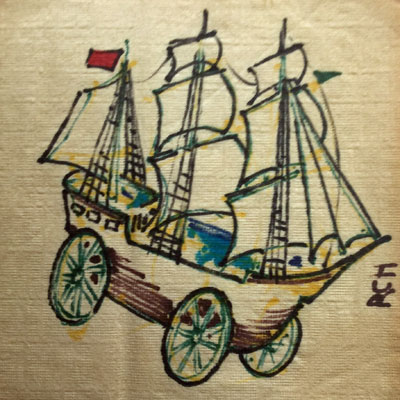
Sea Gull Cellar Bar Napkin Art, Roy Hoggard artist
Dana kept his promise. His fidelity to the vow he made became the purpose of his life and cost him greatly.
He wrote a book, The Seaman’s Friend, “a compendium of practical seamanship, nautical custom, and maritime law. Complete with a “Dictionary of Sea Terms,” the book became the standard treatise on seamanship in America and England, where it was published as the Seaman’s Manual. Dana went from “hapless and pitiable” landsman to indispensable guide for sailors in little more than a half dozen years.”
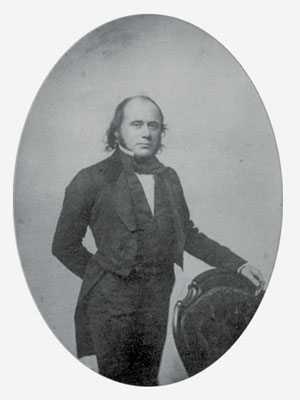
Attorney Richard Henry Dana Jr., picture from Slavish Shore, Jeffrey L. Amestoy
He defended common sailors who suffered abuse from cruel captains. He wrote an essay in the American Jurist arguing that Supreme Court Justice Joseph Story, his former professor, improperly sentenced the Captain and First Mate of the Caravan for their part in the death of a seaman. He defended runaway slaves including the famous case of Thomas Sims and the extraordinary Anthony Burns. Both Sims and Burns were eventually sent back to their masters but Dana’s eloquent arguments against the Fugitive Slave Law and in support of the abolitionists turned the tide that ultimately swept away the scourge of slavery.
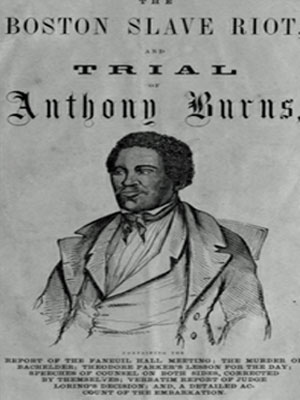
picture from Slavish Shore by Jeffrey L. Amestoy
Burns was later freed and made it back to Boston where he visited Dana to thank him for his legal work. Dana was moved to write:
“What a change … now he visits the scene of his agony of trial, a hero, a martyr, with crowds of the learned & intelligent … listening to his words! … Who can tell what a day may bring forth! Who can tell what other things & which are the men that are to move the world.”
According to Amestoy:
The qualities—courage, integrity, and a sense of justice—that led to his acceptance as a common sailor before the mast were the traits least valued by his peers. “He was a counsel of the sailor and the slave,” wrote Charles Francis Adams Jr., “courageous, skillful but still the advocate of the poor and unpopular … In the mind of the wealthy and respectable Boston almost anyone was to be preferred but him.”
Dana had many successes as an attorney but they were all on the wrong side in the eyes of his Boston Brahmin friends. Yet, in spite of that, he managed to accomplish something great for America. He successfully argued for President Lincoln and made the government’s case before the U. S. Supreme Court in the famous Prize Cases. Dana’s success against what seemed insurmountable odds was one of the key factors in an ultimate victory for the Union in the Civil War.
Dana’s many friends and admirers included Herman Melville who consulted with Dana while writing Moby Dick. “If you want to know the Cape,” said Melville, “get my friend Dana’s Two Years Before the Mast—it must have been written with an icicle.” The icicle refers to the freezing weather Dana described while rounding the Cape.
Toward the end of his life, Dana judged himself harshly.
My life has been a failure, compared with what I might and ought to have done,” he said. He had to work long hours to make a living because he felt obligated to represent those who often couldn’t pay. “Wealth never attracted me. I like honor. I like adventure. I like romance, but I believe I am indifferent to wealth.” Yet, he had some optimism about the after life. A line from his famous book reads: “To work hard, live hard, die hard, and go to hell after all, would be hard indeed! [Amestoy]
Information stored from long ago pops to the forefront when the right buttons are pushed by those neurons that form my “crown of thorns.” “The power of “small coincidences” is an automatic result.
One small coincidence: Dana and I share the same birthday. Another: Dana made a second trip to California and made it as far north as the Napa Valley where he met “old Mr. Yount, the famous pioneer and woodsman, the first white settler in the Napa Valley.”
Dana was fascinated by Yount’s stories of early California days, when Napa Valley was full of “Grisslies.” More intriguing to Dana than Yount’s account of California’s notorious bears was “Yount’s famous dream, as told by him to me,” wrote Dana. Yount said that for three successive nights he dreamt of coming upon a mountain pass where “men, women and children were ‘snowed up’ starving to death.” Yount said he had been so disturbed by the dream that he told it to others, describing the mountain pass (where he had never been) and the physical features that appeared in his dream. Fellow trappers said they knew of such a place, and a group was assembled to hike to the pass. There they discovered the “Donner Party” of pioneers trapped in the mountain pass by a treacherous storm, the survivors of whom had eaten their dead. [Amestoy]
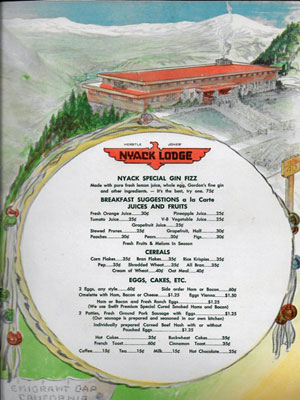
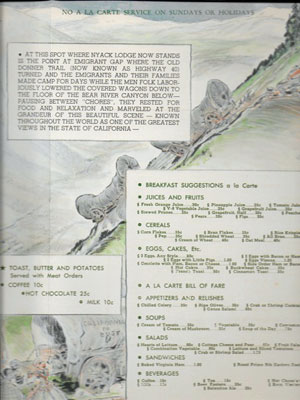
While reading this passage, it did not escape me that my father built and operated a hotel located along the Old Donner Trail. He even commissioned a song to promote business. It was never recorded but I remember him proudly singing a few lines to me when I was alone with him:
Seekers of gold
And lovers of old
Followed an old mountain trail.
The seekers have gone
But love still goes on
As you follow that
Old Donner Trail.
Just riding along
With a gal and a song
Following the Old Donner Trail.
You’re nearer by far
To your own lucky star
As you follow that Old Donner Trail.
Many coincidences have simple explanations if one digs deeply enough. I became interested in the Frolic because I lived in Mendocino. That’s where I first heard the story. Dana’s book was very popular among adventurers and “seekers of gold” heading to California during the 1850s. It’s no surprise the book was mentioned in a video on the Frolic. Coincidences are inevitable and meaningless but they are enjoyable at least to me.
The famous abolitionist, statesman, and writer Frederick Douglass may have worked on the Frolic according to the video. We know he worked in the Boston shipyards for the company that made the Frolic. Douglass knew Dana from the Fugitive Slave case of Thomas Sims. The two once shared the speaker platform at Faneuil Hall in Boston according to Amestoy’s biography. When Sims was sent back to his “master” in the South, Daniel Webster was “triumphant.” Webster had designs on the Presidency and he supported slavery to gain votes in the South. Frederick Douglass was furious: “Daniel Webster has at last obtained from Boston … a living sacrifice to appease the slave god of the American Union.” Dana, though he respected Webster for his great speaking abilities, agreed completely with Douglass. Dana had done everything he could to obtain legal freedom for Sims.
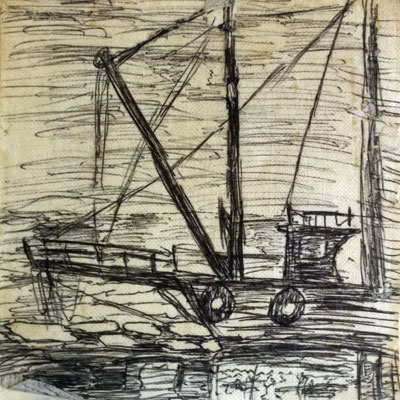
Sea Gull Cellar Bar Napkin Art, artist unknown
Uncle Tom’s Cabin by Harriet Beecher Stowe introduced Americans to a man Dana had already met. The slave trader Haley in the novel was based upon John Caphart, the witness used by U.S. Attorney Lunt in the rescue trials to prove that Shadrach Minkins was a slave. When some critics suggested that Stowe’s portrayal of Haley’s cruelty was exaggerated, the author wrote to Dana that it was testimony in the rescue trials that “helped me essentially in an insight into the character of a negro catcher.” Stowe asked Dana to forward his cross-examination of the man “who professed to have been a whipper of the South & who told of his regular terms of a head.” Dana replied with an account “the accuracy of which you may rely upon.”
Friends such as Frederick Douglass and Harriet Beecher Stowe did not ingratiate Dana to the Boston Brahmin crowd or further his career as an attorney. According to Amestoy:
It was a time, wrote Emerson, “when judges, bank presidents, railroad men, men of fashion, and lawyers universally, all took the side of slavery.”
Social and business Boston “became in its heart, and almost avowedly, a pro-slavery community; and it so remained until 1861.”
“Well,” said Massachusetts Senator John Davis, “the result of my observation of a long congressional life is that Slavery controls everything here.”
On one of his occasional long trips away from the stifling atmosphere of Boston, Dana boarded a ship for Cuba. He wrote a short book about the trip, To Cuba and Back. As always with his sharp eye and unwavering humanity he noticed the cruelty of slavery on the island made worse by the substitution of sugar for coffee on the plantations. With some prescience he wrote about the evil of slavery whether of blacks or of the imported Chinese laborers.
But, to return to the changes wrought by this substitution of sugar for coffee. The sugar plantation is no grove, or garden, or orchard. It is not the home of the pride and affections of the planter’s family. It is not a coveted, indeed, hardly a desirable residence. Such families as would like to remain on these plantations are driven off for want of neighboring society. Thus the estates, largely abandoned by the families of the planters, suffer the evils of absenteeism, while the owners live in the suburbs of Havana and Matanzas, and in the Fifth Avenue of New York. The slave system loses its patriarchal character. The master is not the head of a great family, its judge, its governor, its physician, its priest and its father, as the fond dream of the advocates of slavery, and sometimes, doubtless, the reality, made him. Middlemen, in the shape of administradores, stand between the owner and the slaves. The slave is little else than an item of labor raised or bought. The sympathies of common home, common childhood, long and intimate relations and many kind offices, common attachments to house, to land, to dogs, to cattle, to trees, to birds—the knowledge of births, sicknesses, and deaths, and the duties and sympathies of a common religion—all those things that may ameliorate the legal relations of the master and slave, and often give to the face of servitude itself precarious but interesting features of beauty and strength—these they must not look to have. This change has had some effect already, and will produce much more, on the social system of Cuba.
Yesterday I drove out to the Cerro, to see the coolie jail, or market, where the imported coolies are kept for sale … The importer receives $ 340 for each coolie, and the purchaser agrees to pay the coolie four dollars per month, and to give him food, and two suits of clothes a year. For this, he has his services for eight years.
Listening to his impression of the Spanish government in Cuba might have saved us years of struggle with our island neighbor.
In fine, what is the Spanish government in Cuba but an armed monarchy, encamped in the midst of a disarmed and disfranchised people?
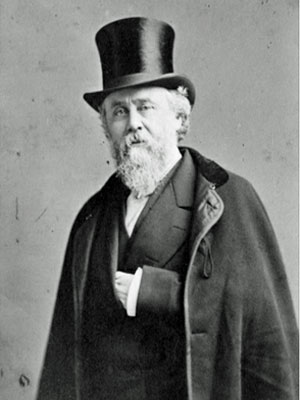
Dana near the end of his life, picture from Slavish Shore by Jeffrey L. Amestoy
At around 60 Dana retired from his law practice and moved to Paris, later to Rome, with his wife and two daughters. He hoped to write a book on international law. It was not to be finished. He died suddenly and unexpectedly from what appears to have been heart issues. Biographer Amestoy writes of the impact of Dana’s death on Captain Faucon of the ill-fated Frolic. Faucon was ten years Dana’s senior.
The news of Dana’s death had come to E. H. Faucon, former master of the Pilgrim and the Alert, “so suddenly that I am dazed.” The elderly retired sea captain wrote to Richard Henry Dana III: “My first acquaintance of your father was at San Diego in July 1835.… His place as a boy before the mast, how he was berthed and lived and the work he had to do, I know all about. From first to last he never shirked or hung back, he was always ready.” Faucon retired to Boston, where he saw the effect of the pressures upon Dana: “He had greatly changed in appearance, & not for the better.” But the captain rejoiced when, after Dana’s second visit to California, “his healthy look had returned.” Dana was preparing a new edition of Two Years Before the Mast, and “we sat up together in Cambridge, nearly the whole of winter’s evening going through the whole book.” “Never from my first seeing him, did I ever know or hear of anything respecting him that was not of the highest credit,” wrote Faucon. “As a frank and fearless boy who deliberately took his side without fear of the cost, spoke his mind with all plainness yet dignity and courteousness, I speak of him with the knowledge of many years.” Faucon was still “doubting the truth” that Dana was dead. The young sailor was before him: “I can see him now as distinctly as though it was this morning … the picture of rude health, cheeks, rosy and full and hardy, the whole face with that color given by active life, exposure to a hot sun, and all weathers.
What, you might ask if you’ve made it this far, is this post on Dana and coincidences really about? It’s about my belief that common decency and respect toward others eventually wins, that truth over time undermines falsehood, and that we are stronger together even with our differences. Dana’s life in some small way reinforces these beliefs. That’s an important observation at a time when we are each called upon to step up to our “shared responsibility” of “preserving what works and defending the rules and values upon which democracy depends.”
I will end by reiterating the words of Valeria Luiselli with which I started:
“Ever since I was left somewhat alone, without gods, I have been a ferocious believer in the power of small coincidences. That is how chance works, at least for those of us who do not have the certainty of grander schemes.”
If you look for coincidences, you will find them everywhere. I don’t think that’s an overstatement. If you have any interest in the immigrant problems of today, I hope you read Luiselli’s book, Tell Me How It Ends, and think about how Dana would have reacted to the stories she presents. I also recommend Jeffrey L. Amestoy’s wonderful biography of Dana, Slavish Shore, from which I took the liberty of posting many quotes and pictures. You’ll find much more of interest in the book. Happy reading !
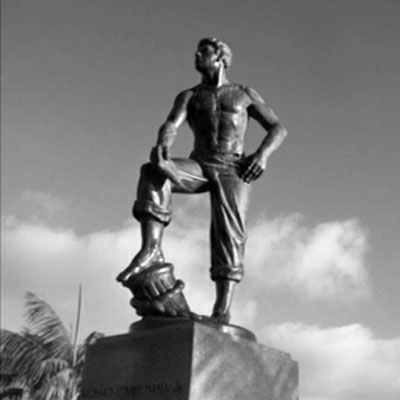
Dana Statue at Dana Point, picture from Slavish Shore by Jeffrey L. Amestoy

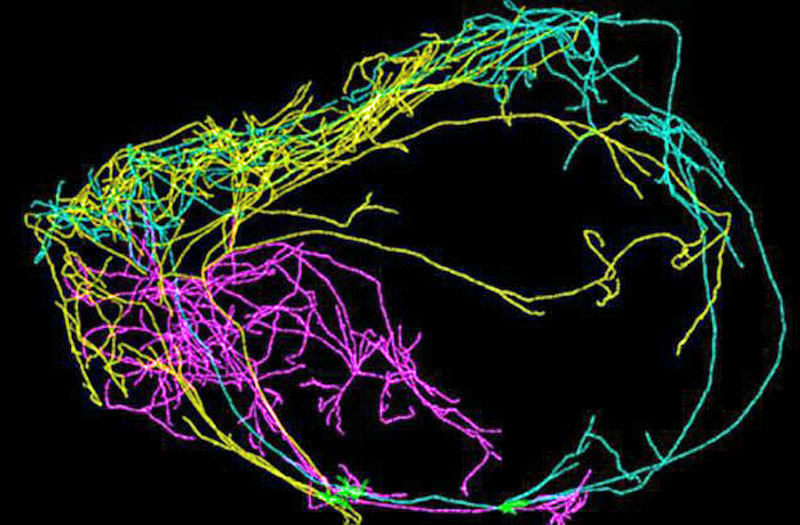
I was delighted to find – on Easter Morning – your excellent rumination on Dana and ethical optimism. Thanks for writing it.
Jeff Amestoy
ps I was unfamiliar with the wonderful William Blake quote that provides the title to your blog. I have over my bookshelves a Blake quote (“I will not reason and compare. My business is to create.”)
Coincidence?!
Thank you. Your biography is excellent. I’ve recommended it to many friends. Oh, and as for coincidences, our joint appreciation of Blake may qualify although it’s more likely good taste shared even by those as geographically distant as Mendocino and Vermont.
I am finishing reading Dana’s three-volume journal of his trip around the world. I was lead to it after reading, “Two years…”
I appreciate what you have written about him. His books bear witness to his character.
What a guy !
He was a great inspiration to many authors such as Melville. Thanks for your comment.